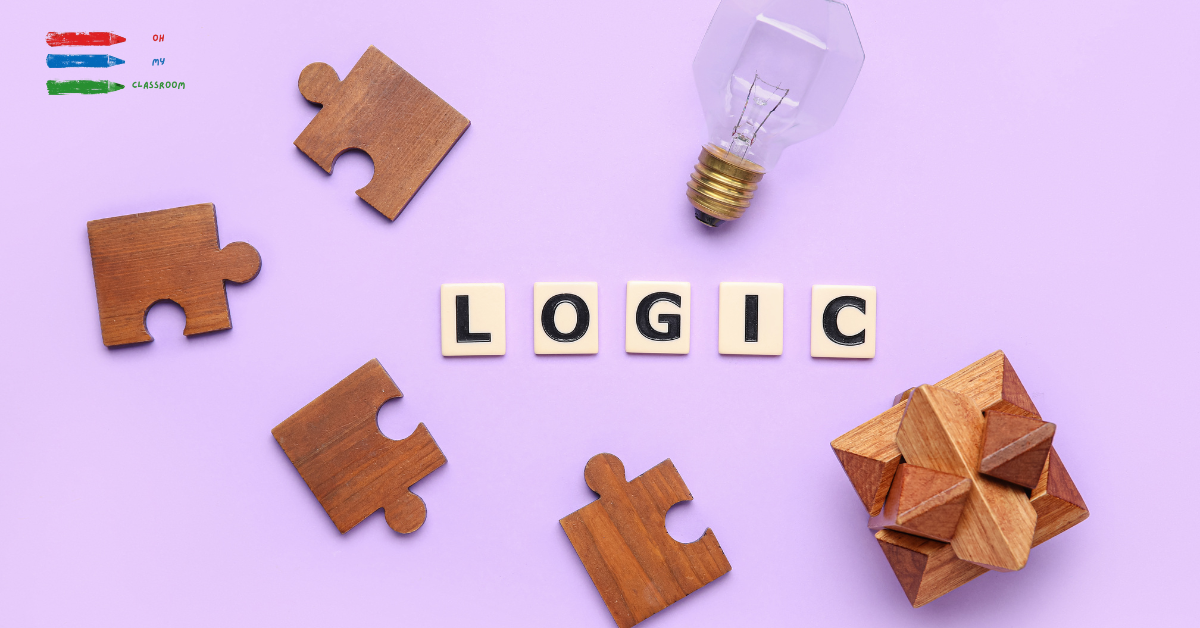5 Math Logic Puzzles For 3rd & 4th Grade
Logic Puzzles: A Fun Way for Little Kids to Grow Smart
Logic puzzles are a super fun way for early elementary kids to get better at thinking!
Simple puzzles, like these below, help kids think logically, improving decision making and even communication! Studies showed kids who play these games get 20% better at math because they learn to think logically—perfect for school stuff like math or science later on.
An added bonus is that puzzles like these teach kids to keep trying even if they get stuck – awesome for building patience. They help with focus and talking skills as kids explain their ideas, like “If John doesn’t like the red chair, he MUST like the green one!!”
Designed for students in kindergarten through 2nd grade, these brain teasers encourage young minds to observe patterns, make connections, and develop perseverance, all while having a blast! Whether you’re a parent, teacher, or homeschooler, these puzzles make a great addition to your learning toolkit.
This kind of thinking helps shape their thinking and prepares them for future challenges like algebra in middle school. Best of all, puzzles feel like playtime, so kids love learning without even knowing it! It’s a great way to help them grow into clever, problem-solving grown-ups.
What Are Logic Puzzles?
Logic puzzles are games or challenges that require kids to use their brains to figure out the answer. For young learners, this could mean:
- Finding patterns
- Solving simple riddles
- Matching shapes and colors
- Following visual clues
- Eliminating incorrect answers through reasoning
These puzzles are designed to challenge the brain while being developmentally appropriate and fun.

How to Use Logic Puzzles in the Classroom or at Home:
- Morning Brain Warm-Up: Start the day with a quick puzzle to activate thinking.
- Center Activities: Set up a puzzle station for small group learning.
- Fast Finisher Task: Keep early finishers engaged with fun logic games.
- Homework or Take-Home Challenge: Involve parents in the learning process.
- Quiet Time Activity: Perfect for individual focus or calm transitions.
Types of Early Elementary Logic Puzzles:
1. Pattern Puzzles: Help children recognize and continue patterns using shapes, colors, numbers, or pictures. Great for early math skills.
2. Sudoku for Kids: Simplified versions of Sudoku help children develop logical reasoning without using complex numbers.
3. Mystery Grids (Who Did It?): Kids use a grid and clues to solve a mystery like “Who has which pet?” or “Who is eating what snack?” These are early versions of logic grids.
4. Odd One Out: Children find the image or word that doesn’t belong in a group, building classification and reasoning skills.
5. Visual Puzzles: Includes mazes, spot-the-difference games, and shape-matching activities that develop spatial awareness.
6. Sequencing Challenges: Kids place pictures or events in the correct order to build storytelling and time-sequencing skills.
7. Riddle Cards: Simple riddles encourage kids to think abstractly and use reasoning to find the answer.

Tips for Success:
- Start with simple puzzles and gradually increase difficulty.
- Offer encouragement and allow kids time to think—it’s okay to struggle!
- Use colorful visuals to keep young learners engaged.
- Turn puzzles into games or competitions to increase motivation.
Ready to dive into logic puzzles?
Download these logic puzzles for free, complete with answers. Enjoy!


